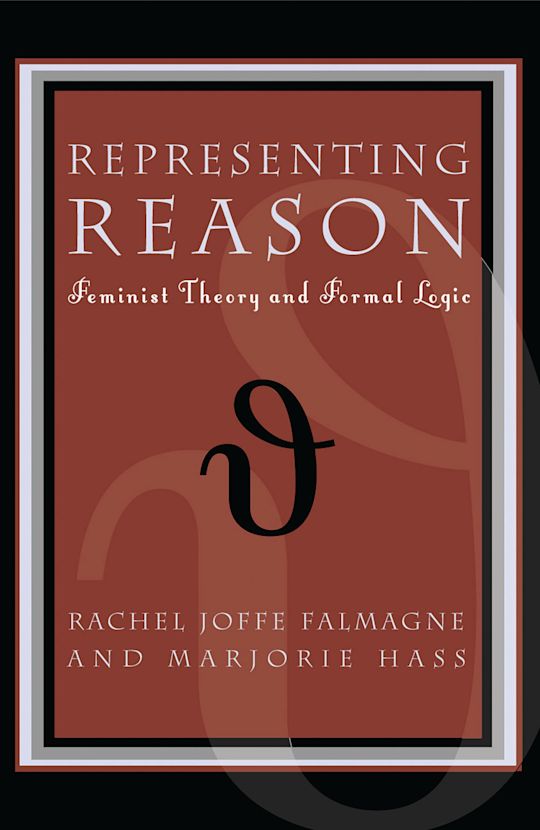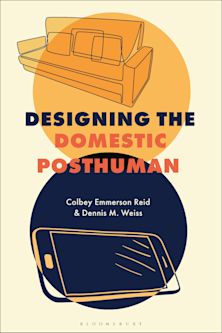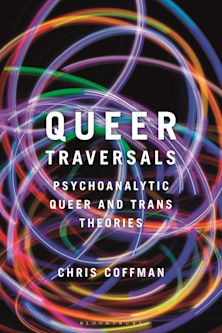- Home
- ACADEMIC
- Philosophy
- Philosophy of Gender and Sexuality
- Representing Reason
Representing Reason
Feminist Theory and Formal Logic
Rachel Joffe Falmagne (Anthology Editor) , Marjorie Hass (Anthology Editor) , Val Plumwood (Contributor) , Carroll Guen Hart (Contributor) , Dorothea E. Olkowski (Contributor) , Marie-Genevieve Iselin (Contributor) , Lynn Hankinson Nelson (Contributor) , Jack Nelson (Contributor) , Andrea Nye (Contributor) , Pam Oliver (Contributor)
Representing Reason
Feminist Theory and Formal Logic
Rachel Joffe Falmagne (Anthology Editor) , Marjorie Hass (Anthology Editor) , Val Plumwood (Contributor) , Carroll Guen Hart (Contributor) , Dorothea E. Olkowski (Contributor) , Marie-Genevieve Iselin (Contributor) , Lynn Hankinson Nelson (Contributor) , Jack Nelson (Contributor) , Andrea Nye (Contributor) , Pam Oliver (Contributor)
You must sign in to add this item to your wishlist. Please sign in or create an account
Description
Philosophy's traditional "man of reason"-independent, neutral, unemotional-is an illusion. That's because the "man of reason" ignores one very important thing-the woman.
As feminist philosophy grew in the 1980s and '90s, it became clear that the attributes philosophical tradition wrote off as "womanly" are in fact part of human nature. No longer can philosophy maintain the dichotomy between the rational man and the emotional woman, but must now examine a more complex human being, able to reason and feel. Yet feminist philosophy also makes it clear that men and women theorize the world in different ways, from different perspectives. Representing Reasons: Feminist Theory and Formal Logic collects new and old essays that shed light on the underexplored intersection of logic and feminism.
The papers in this collection cross over many of the traditional divides between continental and analytic philosophy, between philosophical reflection and empirical investigation, and between empirical investigations with an individual or societal grain of analysis. This is possible because Representing Reasons frames the relationship between logic and feminism in terms of issues rather than historical figures or methodologies. As such, the articles serve as a model for crossing these divides, just as they break down the traditional divide between logic and feminism.
Table of Contents
Chapter 2 Part One: Logic and the Structure of Thought
Chapter 3 The Politics of Reason: Towards a Feminist Logic
Chapter 4 Feminism and the Logic of Alterity
Chapter 5 Fluid Thinking: Irigaray's Critique of Formal Logic
Chapter 6 Power in the Service of Love: John Dewey's Logic and the Dream of a Common Language
Chapter 7 Words of Power and the Logic of Sense
Chapter 8 Part Two: Logic and Empirical Knowledge
Chapter 9 On Mapping a Transdisciplinary Approach to Reasoning
Chapter 10 Logic From a Quinean Perspective: An Empirical Enterprise
Chapter 11 Saying What It Is: Predicate Logic and Natural Kinds
Chapter 12 What do Girls Know Anyway?: Rationality, Gender, and Social Control
Product details
| Published | 16 Oct 2002 |
|---|---|
| Format | Ebook (Epub & Mobi) |
| Edition | 1st |
| Extent | 256 |
| ISBN | 9781461711377 |
| Imprint | Rowman & Littlefield |
| Publisher | Bloomsbury Publishing |
About the contributors
Reviews
-
In this excellent collection, the authors develop insightful critiques of formal logic's claims to universal authority and transcendence, and they propose creative reconstructions of a rational domain long believed impervious to gendered political critique. These innovative essays engage debates in analytic philosophy, pragmatism, and continental thought, forging productive connections between logical formalism and concrete experiences....
Lorraine Code, York University, Toronto
-
Feminist Theory and formal logic have long been thought to exist in worlds apart. This important collection brings these worlds together and shows the political undertones of even our most abstract concepts.....
Linda Nicholson, Susan E. and William P. Stiritiz Distinguished Professor of Women's Studies, Washington University, St. Louis
-
This volume presents both feminist theorizing and theorizing about formal logic at their best. Feminist theorizing emerges from these essays as a growing critical movement that is showing that no area of philosophy is unsusceptible to constructive feminist rethinking. For anyone who still thinks that feminist theorizing and formal logic have little to do with each other (yet who likes to keep their views up to date), this book is essential reading.
Phyllis Rooney, Oakland University, Michigan
-
In this excellent collection, the authors develop insightful critiques of formal logic's claims to universal authority and transcendence, and they propose creative reconstructions of a rational domain long believed impervious to gendered
political critique. These innovative essays engage debates in analytic philosophy, pragmatism, and continental thought, forging
productive connections between logical formalism and concrete experiences.Lorraine Code, York University, Toronto
-
Feminist Theory and formal logic have long been thought to exist in worlds apart. This important collection brings these worlds
together and shows the political undertones of even our most abstract concepts.Linda Nicholson, Susan E. and William P. Stiritiz Distinguished Professor of Women's Studies, Washington University, St. Louis



































